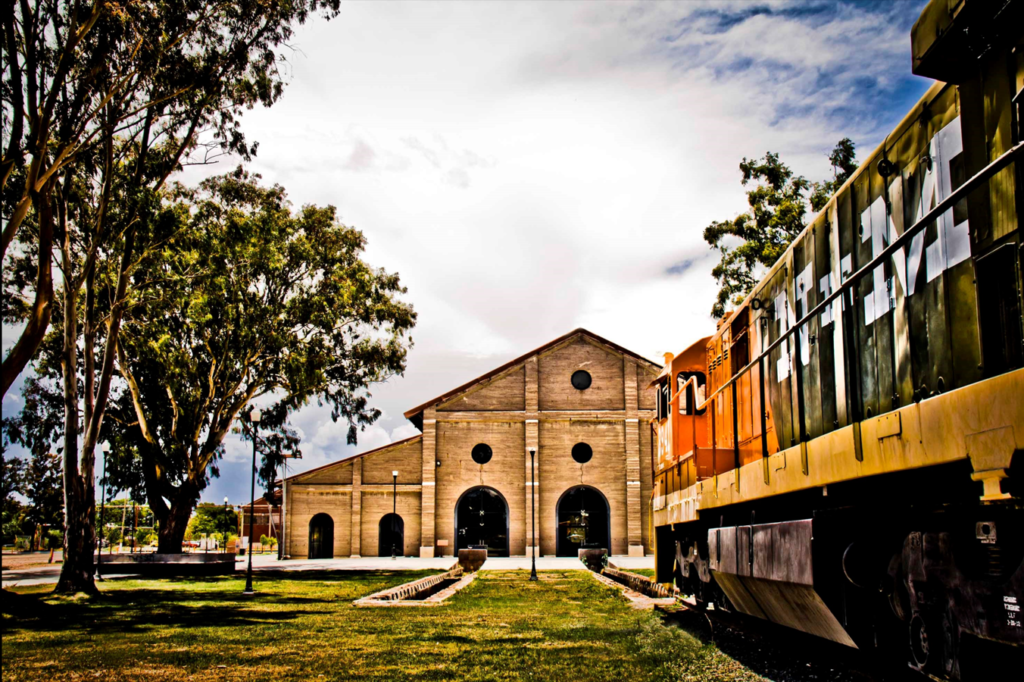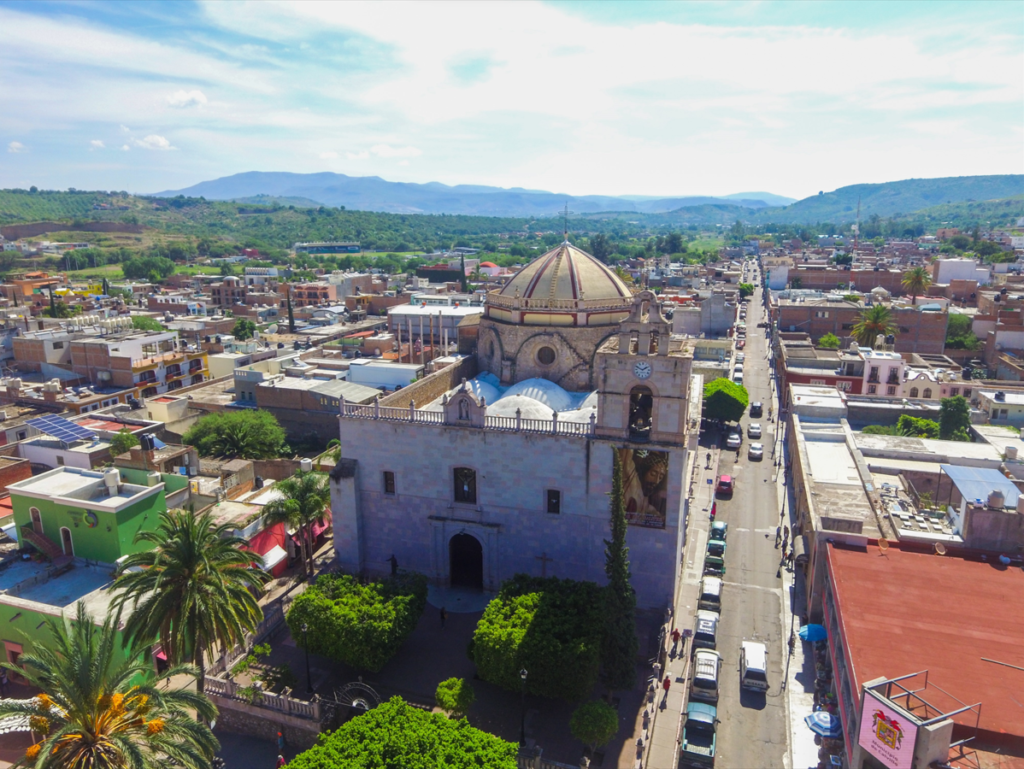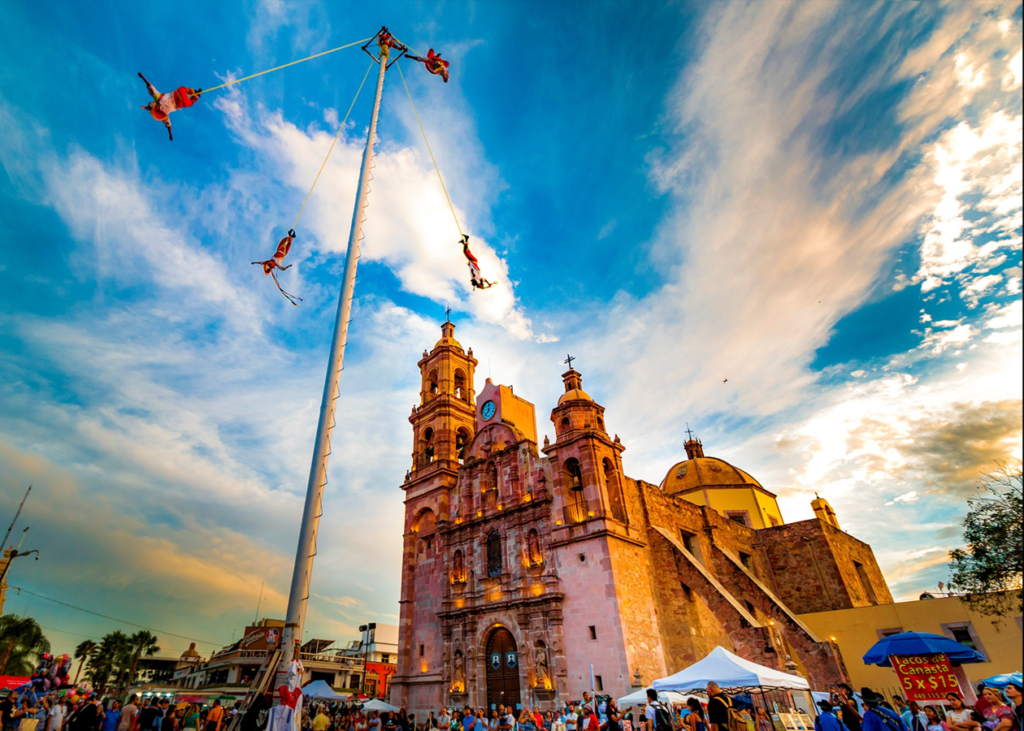
Aguascalientes, Mexico – November 24, 2023 – To know Mexico’s State of Aguascalientes is to discover Mexico on a more intimate level. It’s a place that is steeped in centuries-old traditions, history, and culture and embodies so much of what makes up the fabric of Mexico as a whole. With a history spanning more than five centuries, Aguascalientes is Mexico personified.
The museum-rich capital of Aguascalientes is peppered with leafy parks, lined with broad boulevards, and dressed up with impressive architecture. It’s a city that is as known for its industrial history as it is for its ornate cathedrals, rich wine culture, and high-end shopping.
A small city compared to some of Mexico’s other capitals, Aguascalientes packs a punch. Discover the very best of this important state in Mexico with the top 10 activities in Aguascalientes.

Temple of San Antonio
Like something out of an obscure fantasy novel, Aguascalientes’ Templo de San Antonio is unlike any other cathedral you’ll find in Mexico. The prestigious and hauntingly beautiful monument is quilted together with a variety of architectural styles, including neoclassical, baroque, gothic, Arabic, and Russian. More than just a mishmash of styles, it’s a swirl of brilliant colors, like yellow, green, and pink, all reflected in the veins of the quarry stone that was used to construct it. The mesmerizing structure is finished off with other opulent touches, like a stained glass Russian dome, towers, and soaring vaulted ceilings.
Jardin de San Marcos
An oasis of green in the city center of the city of Aguascalientes, the Jardin de San Marcos sits tucked behind an impressive stone archway. Creating a separate space away from the buzz of the city’s energy, the park is a beloved hideaway of peace and tranquility right in the heart of downtown. Explore the meandering pathways that crisscross the garden, or enjoy one of the many public events that are held at the central fountain. In fact, the San Marcos Fair is one of the most beloved city traditions and has been held since 1828.

Cathedral Basilica of Our Lady of the Assumption
Classically beautiful, stately, and rich in history, the Cathedral Basilica of Our Lady of the Assumption is one of Aguascalientes’s most important religious houses. The building dates back to 1704, though the construction was completed in 1738. Visitors are greeted by two massive twin towers. Inside the cathedral is a wash of white marble and the image of the Virgin of the Assumption, the patron of the city of Aguascalientes.
Parque Tres Centurias
History, culture, and community collide at the Parque Tres Centurias in downtown Aguascalientes. Aguascalientes’ history is deeply rooted in railway heritage. The railroad played an important part in the industrialization of not only the state of Aguascalientes but in Mexico as a whole. Get to know the rail history of the state with a visit to the park, where tourists can explore historic sites like The Hidrocalida, a stunning locomotive that stands at the entrance to the plaza. Don’t miss the park’s impressive fountain, the largest in Latin America, which displays up to 60 different colors and whose spout can reach up to 12 meters.
Plaza Patria and Exedra
Spread out in front of the Cathedral Basilica of Our Lady of the Assumption is the Plaza Patria or the main square of Aguascalientes. It is the premiere center of life in the city, as well as one of the most historic. Here is where visitors will find the Government Palace and the Municipal Palace, as well as the Legislative Palace and the Old Imperial Hotel. At the center of the square is the Exedra, a tall column, crowned with a sculpture of an eagle devouring a serpent, the national symbol of Mexico.
Santa Elena Winery
Mexico has some serious players in the international wine market, and Aguascalientes is one of them. The Vincola Santa Elena is one of the best wineries in central Mexico, featuring a vineyard, cellar, and wine cave where visitors can come to tour the grounds and take a tasting. The winery is known for producing decadent, full-bodied wines using varietals like Nebbiolo, Malbec, Cabernet Franc, and Merlot.

The National Museum of Death
Spirituality is deeply ingrained in Mexican society and culture. The afterlife is one of its greatest fascinations, and keeping connected with the spirit world is a vital part of what it means to be Mexican. Aguascalientes has a museum dedicated to the afterlife, known as the National Museum of Death. The collection depicts the historic role of death and the funeral arts within Mexico, both throughout history and into the present day. The museum’s collection includes paintings, sculptures, lithographs, and photos, all of which are used to illustrate the relationship between the living and the dead.
Jose Guadalupe Posada Museum
Speaking of Mexico’s relationship with death, Dia de Los Muertos is one of the most important cultural traditions in the country. One of the great symbols of Day of the Dead is the iconic skeleton, “La Calavera Catrina.” The artist who created her was Jose Guadalupe Posada and Aguascalientes features a museum dedicated to his life’s work. Posada began producing illustrations of death following a massive flood that swept through Aguascalientes in 1882. The destruction was so overwhelming that it fueled his fascination. Death became a lasting theme in his art, which is on display at this Aguascalientes museum dedicated to his work.
Museum of Aguascalientes
Perhaps the best place to get a comprehensive overview of the culture and historical significance of Aguascalientes is at the city museum. Built in 1903, the pink stone, neoclassical building recognizes the work of the most famous artists from the state of Aguascalientes. The collection features paintings and sculptures from artists like Jesus F. Contreras, Francisco Diaz de Leon, Gabriel Fernandez Ledesma, and Saturnino Herran. It is one of the premier museums in the country that celebrates the life and work of acclaimed Mexican artists.












